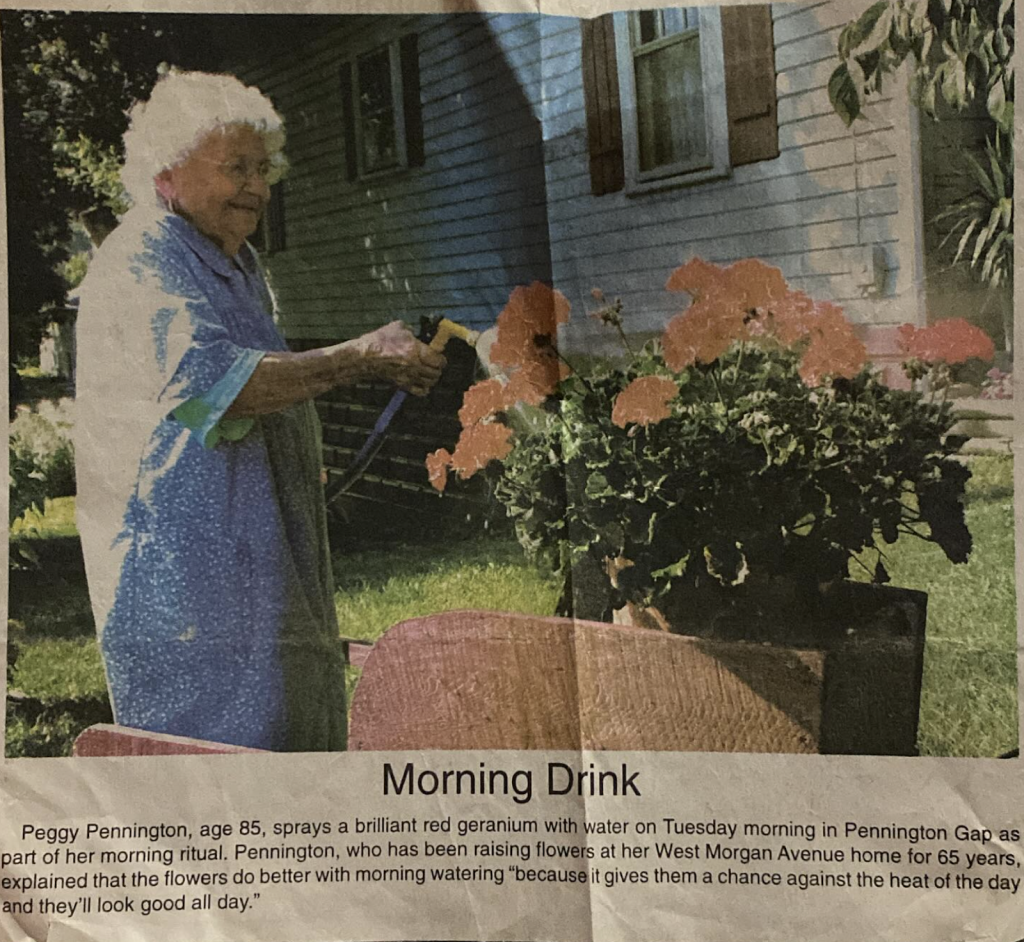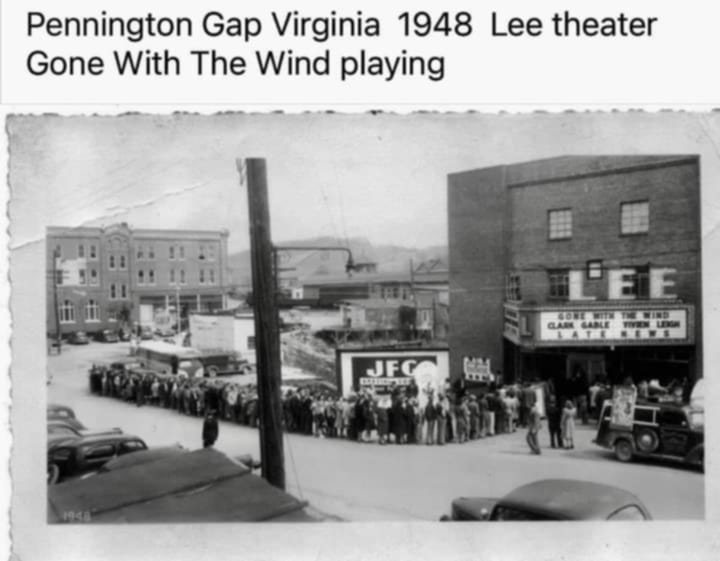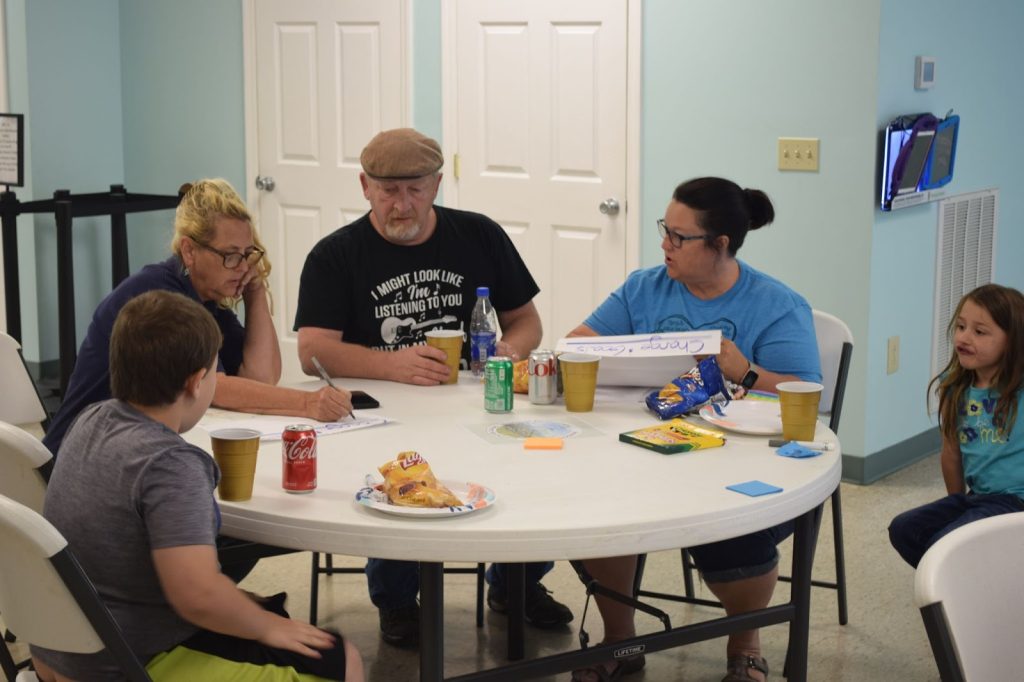Front Porch Blog
Home. That’s the word that always immediately comes to my mind when I think of Pennington Gap, Virginia. In fact, the town of Pennington Gap is such a part of my own personal history and the larger history of my own family that I’d scarcely know who I am without it as the backdrop for my most formative years.
A child of the mid-1980s, I spent the first 20 years of my life in Pennington Gap. Though I spent much of my early 20s bouncing around Tennessee and have spent most of my adult years in relatively nearby Norton, there is nowhere on earth that feels quite like home to me in the way that Pennington Gap does.
When I think of growing up in my hometown, there are so many sights, sounds and smells that bubble up to the forefront of my memory.
I can still remember the faint, slightly sweet odor of paper and glue in the post office lobby, which was right next to my great-grandparents’ house where I spent much of my childhood. When I was a kid, I used to step inside the lobby just to take a big deep whiff. I can still remember the sound of live rock music drifting up to their front porch from Java Jenn’s Coffee House down the street on the corner on Friday nights. And I can still remember how excitedly I used to run out to the back porch of their house to watch coal trains go by where the Pennington Gap Depot stood until the 1970s. My dad used to tell me about how he took a train from Pennington Gap to El Paso, Texas with my grandmother when he was a little boy before they tore the depot down.
Most importantly, though, when I think of Pennington Gap, I think of my Granny Pennington. My great-grandmother was a feisty Appalachian woman who loved to cook, preserve food and garden. During the Great Depression, she married my great-grandfather Toots. He was a small business owner and the son of one of the town’s first doctors, George. George’s grandfather was among the early settlers for whom the town was named. This was always a huge source of pride for my Granny, who had three main rules you better make sure you follow in her presence: Don’t ever disrespect her family; don’t ever disrespect her church; and most importantly, you better not disrespect her town or she was liable to give you an earful for it.

Sadly, despite the vibrancy of the small town I remember from my childhood, Pennington Gap was dealt a series of blows beginning in the late 1990s. As traditional drivers of the local economy like the local coal industry and agriculture began to decline, there was no clear path forward for the town of Pennington Gap and many rural Appalachian communities like it. For a short period in the 2000s, there was a call center where I and many of my friends from high school worked for a while, but by the early 2010s, it had closed, as had the local hospital. These events forced many people out of the ability to live and work locally and caused the area’s most vulnerable people to lose access to comprehensive local medical care.
To make matters worse, as the local economy sharply declined, a sense of hopelessness pervaded the community. Opioid addiction became more and more rampant, so much so that the fictional town of Finch Creek in the Hulu original series Dopesick was largely based on Pennington Gap. Not exactly the sort of thing you want your hometown to be known for — and definitely not the sort of thing my Granny Pennington would be proud of — but at least I can say that Michael Keaton (my personal favorite Batman, of course!) is loosely associated with my hometown. You always have to try to find the silver linings, after all.
Economic distress and its insidious fruits like despair and addiction are certainly not isolated to Pennington Gap or to Southwest Virginia, but they have become sort of cultural and economic “canaries in the coal mine” that have pointed to a deep malaise in the area’s regional culture for some time. Thankfully, however, in the years since the end of the pandemic, there seems to be a renewed spirit of optimism and local pride in the small towns of the region.
Earlier this year, Appalachian Voices hosted our first round of listening sessions across five Southwest Virginia communities: Clincho, Dante, Dungannon, Pound and Pennington Gap. All of these places are very small, rural communities with populations well under 2,000 people. The purpose of the sessions was to identify community needs and address how federal funding from the Environmental Protection Agency’s Environmental Justice Collaborative Problem Solving Program could be used to plan projects that build pathways toward more economically and environmentally resilient communities.
During the meetings, community members were asked to reflect on the ways that their communities had changed over the years. When it came to the Pennington Gap session, I was excited — and pleasantly surprised — to hear how much most members of the community felt that the town had changed for the better in the last few years.
Part of this renewed sense of optimism is due simply to the fact that since 2021, things really do seem to be improving, thanks to developments like the reopening of the Lee County Community Hospital eight years after it shuttered its doors in 2013. The town has also made major investments in its historic downtown area, where a former movie theater that dates back to the 1930s has been transformed into a modern live event venue with a community center next door. Several new businesses, including new restaurants and a family-friendly arcade game lounge have also opened in the town, though locals recognize that more small business growth and investment in local infrastructure are needed and will be vital to continuing the town’s positive economic and cultural momentum.

In 2023, the EPA announced an award of $500,000 to Appalachian Voices for the organization’s Building Community Resilience in Virginia’s Coalfields with Place-based Climate Change Adaptation project through the agency’s Environmental Justice Collaborative Problem Solving Program — a project we’re calling Community Strong. This funding is being divided between the five communities where the Community Strong listening sessions are being held. This funding will be used to plan community-driven initiatives to thrive in the face of economic difficulties, climate disasters and other hurdles.
Pennington Gap also recently received the $80,000 Solutions for Lasting, Viable Energy Infrastructure Technologies Prize, known as the SOLVE IT Prize, from the U.S. Department of Energy for Phase 1 (to conduct community outreach and a feasibility study to identify a community-supported energy project). Top contenders currently include the installation of solar panels on the town hall building or electric vehicle charging stations in town.
Additionally, Pennington Gap received nearly $50,000 from the Virginia Community Flood Preparedness Fund to pay for floodplain management training for town employees and improve flood mitigation along the town’s greenbelt.
Taken together, this means that there is a considerable stack of funding to keep the positive momentum going in Pennington Gap, with the town and other communities like it serving as examples of what community-based economic development can accomplish with the right leadership, vision and funding opportunities.

For too long, Appalachia’s — and by extension America’s — small, rural communities have been largely left to experience their own slow decline in isolation, with many cultural and social ills following hotly on the heels of that undeserved distress. Given the challenge, some may be tempted to ask why rural community-based economic development matters at all.
I may be a bit biased, but I believe that America’s small towns deserve the opportunity to be just as vibrant and alive as its big cities. We owe it to our communities’ future — and our country’s future — to ensure that children from small towns like Pennington Gap have the same level of educational and career opportunities as their urban counterparts.
As we proceed into the 21st century, we have to ensure that there are abundant and equitable economic opportunities for the people of far Southwest Virginia that look to the future rather than Appalachia’s extractive industry past. In the post-Covid world where professional remote work is more available than ever before, towns like Pennington Gap can be a more affordable living and working alternative to the fast pace of America’s cities. But none of this can happen without the proper investments in clean energy, infrastructure and disaster mitigation to transform our country’s smaller communities into vibrant, resilient spaces that can withstand the challenges of the modern world — and have a fair shot in chasing its opportunities.
The work currently underway in Pennington Gap has the potential to provide an excellent roadmap for how — with the right planning, funding and involvement of the community at the grassroots level — small towns can take the reins of their own futures and chart an unapologetically bold path forward.
Learn more about the Community Strong project and upcoming events!
PREVIOUS
NEXT

Leave a comment
Your email address will not be published. Required fields are marked *

Leave a Comment